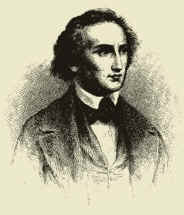|
Makers
Violin History & Timeline
PERFORMERS
Violin
Viola
Cello
Bass
Gamba, etc.
The Roots of Famous Violinists
TEACHERS
Violin
Viola
Cello
Bass
DEALERS
Listings
Specialist
Event
LUTHERIE
Bibliography
Listings
Gallery
COLLECTING
Identification
Buying
Selling
THE INSTRUMENTS
Violin
Viola
Cello
Bass
Viol
Bows
Tales
LINKS
Interesting Sites
GALLERY
Antique Instruments
Historical Photos
|
|
 Unlike
many composers of his day, Felix Mendelssohn was raised in a wealthy
family that encouraged him to pursue his interest in music. Born in
Hamburg, Germany on February 3, 1809, Mendelssohn was introduced to the
arts and to metaphysical modes of thinking at a young age. He was the
grandson of Moses Mendelssohn, one of Germanyís great intellectual
thinkers. Although his family was staunchly Jewish, Felix Mendelssohnís
father took on the surname Bartholdy, and converted to Christianity.
This change was made because of social tensions in Germany, and so that
more musical opportunities would be available to Mendelssohn. A
fortunate man, Mendelssohnís aspirations can to fruition quickly, and
without great struggle. Unlike
many composers of his day, Felix Mendelssohn was raised in a wealthy
family that encouraged him to pursue his interest in music. Born in
Hamburg, Germany on February 3, 1809, Mendelssohn was introduced to the
arts and to metaphysical modes of thinking at a young age. He was the
grandson of Moses Mendelssohn, one of Germanyís great intellectual
thinkers. Although his family was staunchly Jewish, Felix Mendelssohnís
father took on the surname Bartholdy, and converted to Christianity.
This change was made because of social tensions in Germany, and so that
more musical opportunities would be available to Mendelssohn. A
fortunate man, Mendelssohnís aspirations can to fruition quickly, and
without great struggle.
Mendelssohnís mother was an intelligent woman who
continually encouraged the intellectual growth of her children. She
began teaching Mendelssohn and his sister the piano when they were quite
small. His father, a banker, moved the family to Berlin where
Mendelssohn received piano lessons from Ludwig Berger, and theory
classes from Karl Friedrich. Brought up in a cultured and affluent
family, Mendelssohn was spared the penniless existence of a typical
musician.
A brilliant child, Mendelssohn composed his first
piece in 1820, and worked assiduously on improving his musical style.
Goethe and Karl Maria von Weber both visited the Mendelssohnís home
and were astounded by Mendelssohnís musical proficiency. He was a
considered to be another Mozart, and his teachers soon found that he was
in no need of lessons.
One of Mendelssohnís greatest ambitions was to
revive the appreciation of Johann Sebastian Bachís music. In 1829 he
organized and conducted a performance of the Passion, one
of Bachís choral works, in Berlin. Mendelssohn had grown up on Bachís
soothing melodies, and longed for Bach to receive the acclaim that his
music deserved. lie spent a significant part of his life promoting Bachís
works.
After touring internationally, Mendelssohn got
married and became the director Dusseldorf. This was his first
professional musical position, and he was soon elected to an even more
prestigious post. Mendelssohn took on the direction of the acclaimed
Gewandhaus Orchestra in Leipzig. He was responsible for a drastic
improvement in the quality of its music. 1840 found Mendelssohn in
charge of the Academy of Arts in Berlin, and in 1842, with the support
of the crown, he founded a conservatory of his own.
Mendelssohnís continual stream of successes did
take a toll on his health. Although success came to him quickly, he
passed away at the young age of thirty-eight, after suffering a stroke.
He was among the first Romantic composers, and his works infused the
traditional classical modes of composition with a new sense of
tenderness and spirit. One of the most revered musicians of his day,
Mendelssohn was laid to rest in his family vault.
Notes by Shanaira Udwadia (May-2001) |